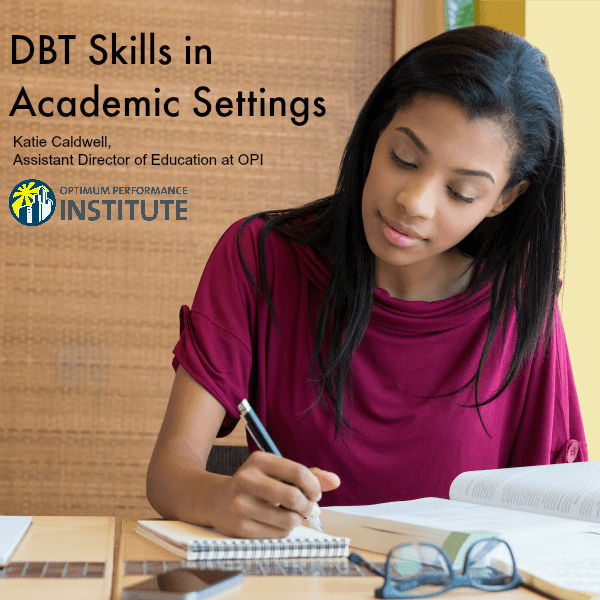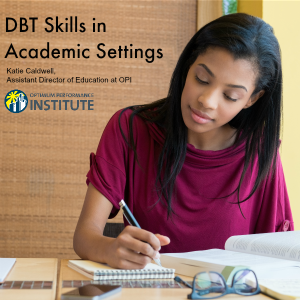
DBT Skills in Academic Settings
 School can be especially difficult for many of our clients. We often see them struggle to stay focused in class, follow through on attending, and many also have issues finding connection with others in school. Though they frequently discuss their use of Dialectical Behavior Therapy (DBT) skills throughout their day at OPI, sometimes it is hard for them to imagine in advance when each skill can be used while they are under stress.
School can be especially difficult for many of our clients. We often see them struggle to stay focused in class, follow through on attending, and many also have issues finding connection with others in school. Though they frequently discuss their use of Dialectical Behavior Therapy (DBT) skills throughout their day at OPI, sometimes it is hard for them to imagine in advance when each skill can be used while they are under stress.
OPI’s Education Department has created a reference list of DBT skills and when each can be used for students. We encourage students to write the DBT skill that works best for them on the top of their notes so they can look back to it when they are feeling anxious or if they are starting to feel themselves losing control of their emotions in class. Many will use their skills to keep from disassociating.
We may primarily associate school-based anxiety with distress tolerance skills, but many other DBT skills can be used before students feel distressed. Students often conflict fact and interpretations and/or assumptions when talking with their peers or teachers. Though it can be difficult to check the facts in that moment, this skill will help keep them from ruminating over past conversations. We also see many students finding it difficult to get themselves to school day in and day out. Using opposite action or creating a pros and cons list can help students find the temporary motivation to attend. Mindfulness skills allow students to participate or simply observe class non-judgmentally while staying present.
Below is a short list of DBT skills with a few suggestions of how they can be applied to a school setting:
MINDFULNESS:
- What: Observe, describe, participate
- How: Non-judgmentally, one-mindfully, effectively
When can we use this skill? When note taking, observing negative self-talk and then switching to non-judgmental, etc.
INTERPERSONAL EFFECTIVENESS:
- DEARMAN: Describe, Express, Assert, Reinforce, Mindful, Appear confident, Negotiate
When can we use this skill? When requesting accommodations, working with other students in groups or projects, when asking for special consideration from the teacher, etc.
- GIVE: Gentle, Interested, Validate, Easy manner
When can we use this skill? Socializing with other students, speaking to your professor, responding in class, etc.
EMOTION REGULATION:
- ABC PLEASE: Accumulate Positive Emotions, Build Mastery, Cope ahead, Physical Illness, Eating, avoid mood Altering substances, Sleep, Exercise
When can we use this skill? Ensuring that you are most prepared to be fully present in class means taking care of yourself physically and mentally.
- Check the facts
When can we use this skill? When you feel that the teacher is treating you unfairly or differently, when stressing about upcoming assignments or grades, when future-tripping or ruminating, etc.
- Opposite Action & Pros and Cons
When can we use this skill? When you are considering missing class, when you are purposefully not completing assignments, when you don’t feel like talking to your professor about missing class/assignments
DISTRESS TOLERANCE:
- IMPROVE the moment: Imagery, Meaning, Prayer, Relaxation, One thing in the moment, Vacation, Encouragement and rethinking the situation
When can we use this skill? Disassociating in class, anxious in class, ruminating, etc.
- Acceptance: Radical Acceptance, Turning the mind, Willingness, Half smiling/willing hands, Mindfulness of current thoughts
When can we use this skill? When you received a grade you didn’t like, when you made it to class but have to remind yourself to be present and positive, when you have a test, when you don’t feel prepared, etc.
What are YOUR thoughts on on using DBT skills in academic settings?
Post by Katie Caldwell, Assistant Director of Education at OPI
